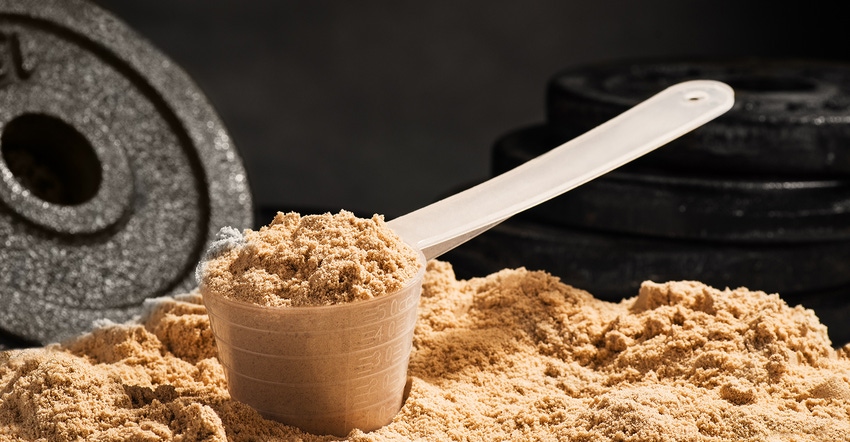Protein use in sports nutrition
Protein is available in various sources and formats, offering unique advantages for formulators’ needs.

Sports nutrition is one of the fastest-growing segments in both the functional foods and dietary supplement markets, and probably the most recognized ingredient in sports nutrition is protein. Protein is generally recognized for playing a role in building muscle mass and repairing injured tissue.
Protein forms
Protein supplements come in various forms, though the most common are protein powders—concentrated forms of protein obtained from either plant or animal sources. They are typically sold in one of three forms. Protein concentrates are the closest to whole food and contain about 60 to 70% protein, with fat and carbohydrates making up the rest. Protein isolates are prepared by removal of the fat and carbs. Protein isolates contain at least 90% protein. Protein hydrolysates are produced by hydrolysis (heating, acid or enzymes) that breaks the amino acid bonds. Hydrolysates consist of mixtures of oligopeptides, peptides and free amino acids.
Considerations influencing protein selection
Protein supplements are easy to find, with numerous options for the protein source and delivery format. However, just like other supplement ingredients, the range of potential benefits varies. Several considerations should influence protein selection when formulating these products.
Consumers looking to improve sports performance will likely prefer products that contain complete proteins—all nine essential amino acids (EAAs) in sufficient amounts. Probably the most popular single source for complete protein is whey. Derived from milk, whey has the advantage of being easily digested and absorbed. It is rich in branched-chain amino acids (BCAAs), which play an important role in muscle development and exercise recovery. However, whey protein concentrate contains milk sugar and lactose, which can be problematic for those who are lactose intolerant. Selecting an isolate can help overcome this obstacle.
Another popular dairy protein is casein. More slowly absorbed than whey, casein may help slow down muscle breakdown during intense exercise. Both whey and casein are commodity ingredients, so quality issues and adulteration are possible.
One of the best sources of complete protein also suitable for some vegetarians is egg protein. Eggs have the highest protein digestibility-corrected amino acid score (PDCAAS), which measures a protein’s quality and digestibility. Egg protein is second only to whey in its content of leucine, the BCAA that plays the largest role in muscle health. Usually egg protein is derived from the egg white, which contains the highest proportion of protein and minimal fat, as the fat in eggs is found almost exclusively in the yolk.
Another part of the egg beginning to get increased attention is the eggshell membrane. This thin, fibrous, protective, dual layer of the egg is mostly protein and is rich in nutrients, including Types I, V and X collagen and several important glycosaminoglycans, such as chondroitin sulfate and hyaluronic acid. Recent research also indicated that unhydrolyzed eggshell membrane might function like a prebiotic source capable of beneficially increasing gut diversity (Sci Rep. 2017;7:43993).
Plant-based
For vegans and vegetarians who don’t consume animal products, selecting a complete protein source might be more of a challenge. Soy protein contains all nine EAAs and is a very popular protein source, but it does have several drawbacks, including its GMO status, allergenicity, digestibility and content of natural estrogens. Fermentation of the soy helps overcome some of these disadvantages.
Pea protein is another common vegetarian protein source. It contains all nine EAAs, though methionine is often very low or absent from some forms. Pea protein is rich in BCAAs. Other good plant proteins include hemp, chia and rice. To ensure a complete plant protein supplement, often there will be a mixture of proteins from different plant sources.
Protein peptides
Shorter-chain protein peptides—typically from beef or chicken—particularly collagen peptides, are also popular protein supplements for athletes and others who purchase supplements to help improve sports performance and offset fatigue. Most collagen peptides are hydrolyzed (partially or completely broken down) to make them easier to absorb through the intestinal wall. These specialized protein supplements may provide support for both joints and bones and help boost muscle mass.
One area that is often neglected when either marketing or purchasing a protein supplement is the possibility of consuming too much protein for the body to adequately break down and absorb. The body breaks down protein quite efficiently provided its gastric, pancreatic and intestinal digestive mechanisms are functioning as they should. But even a minor digestive disruption such as insufficient gastric acid (a real problem for those who must take acid neutralizers) can drastically impact the efficiency of protein digestion, sending too much undigested protein to the colon, where it can be fermented by certain colonic bacteria, potentially producing toxic compounds (Microorganisms. 2019;7[1]:19. According to the Harvard Health Blog, a reasonable goal for most people is taking in around 15 to 25% of total daily calories from protein, but this also depends upon age, sex and activity level.
Protein plays a vital role in supporting the nutritive needs of athletes and others desiring to maintain a healthy, active lifestyle, particularly after middle age. With proper care and consideration, selecting the right protein for a formulation can be a critical tool in helping consumers achieve these goals.
Nena Dockery is a scientific and regulatory affairs manager at Stratum Nutrition. She began her career as a medical researcher at Kansas University Medical Center, but later pursued her master’s degree in human nutrition. With over 20 years’ experience in the nutritional supplement industry, Dockery is knowledgeable in virtually all areas of dietary supplements, from physiological effects to the governing regulations.
About the Author(s)
You May Also Like






.png?width=800&auto=webp&quality=80&disable=upscale)